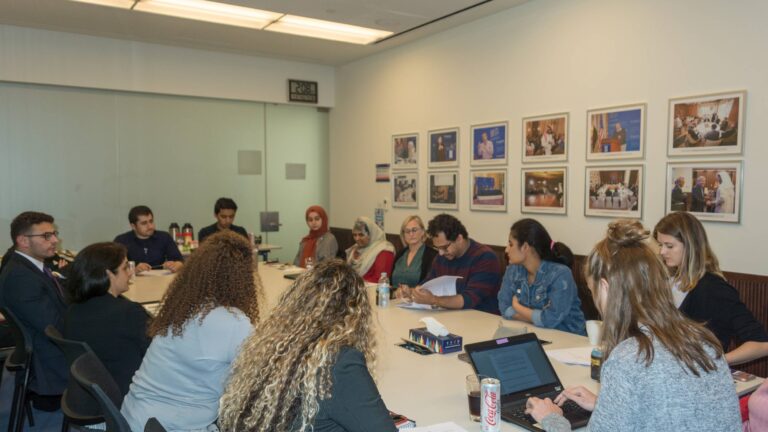Regional Studies, Student Engagement
CURA Seminar: Water and Conflict in the Middle East

On April 12, 2018, CIRS convened its first CURA Discussion Seminar under the center’s new initiative: CIRS Undergraduate Research Advancement. The seminar was introduced to support the research needs of undergraduate students at Georgetown University in Qatar, and to provide them with opportunities to hone their research skills. As part of the seminar, CURA fellows discussed and critiqued two papers from the CIRS research initiative on “Water and Conflict in the Middle East.”
Mohammed Al-Jaberi (class of 2019) started the conversation with a brief summary of Marcus DuBois King’s article, “A Watershed Moment: Hydropolitical Trends and the Future of Iraqi Kurdistan.” This paper addressed the increasingly contentious issue of water stress on the region, due to Iraqi Kurdistan’s emerging socio-political trends, as well as environmental changes such as demographic pressures; dam building by Iran and Turkey; declining water quality; recurring drought; climate change; and earthquakes. The author concluded that if the Kurdistan Regional Government (KRG) did not at least recognize the latter trends’ increasing threat to security, they would further compromise the regions’ water security. King theorized that in order to avoid the adverse impact on Iraqi Kurdistan, the KRG must place water stress as a priority and develop a comprehensive strategy to address the issue.
Rawan Al-Khulaidi (class of 2018) presented Nael Shama and Islam Hassan’s article “In Pursuit of Security and Influence: The UAE in the Red Sea and East Africa.” The article explored the ways through which the United Arab Emirates has attempted to assert its authority over the Red Sea and its ports, showing the importance of the Red Sea and East Africa in the new Emirati leadership’s strategic interests. The article demonstrated how the UAE’s actions and policy arrangements in relation to the Red Sea and its ports reflect a larger change in its foreign policy, which has been evolving for over a decade. This change in Emirati foreign policy is driven by the UAE’s economic wealth; the “rise of Islamism in the region;” the UAE’s military agendas in the border states of the Red Sea – especially those of Djibouti and Yemen; the political environment of the UAE post-Zayed; the shock of the Arab Spring politically and socio-economically; and, finally, UAE-US relations.
Following the presentation of each paper, the CURA fellows engaged in an insightful discussion on the structure and organization of the paper, the employed theoretical and conceptual frameworks, and the clarity of the argument. By focusing on the topic of water and conflict in the Middle East, the students were able to employ the tools and skills of their respective majors—namely international politics, culture and politics, international economics, and international history—to assess, critique, and provide feedback on the papers. Following the discussions, Mohammed Al Jaberi and Waleed Zahoor (class of 2018) presented the fellows’ comments and feedback at the CIRS Working Group, “Water and Conflict in the Middle East.”
For the participants’ biographies, please click here.
Article by Amie Hewka, CURA Fellow at CIRS